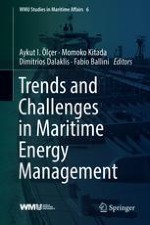2018 | OriginalPaper | Chapter
Developing a Strategy for Liquefied Natural Gas Powered Transport Corridors in the Baltic Sea Region
Authors : Josefin Madjidian, Dimitrios Dalaklis, Vytatutas Paulauskas, Lawrence Henesey, Aykut I. Ölçer, Fabio Ballini, Momoko Kitada
Published in: Trends and Challenges in Maritime Energy Management
Publisher: Springer International Publishing
Activate our intelligent search to find suitable subject content or patents.
Select sections of text to find matching patents with Artificial Intelligence. powered by
Select sections of text to find additional relevant content using AI-assisted search. powered by
